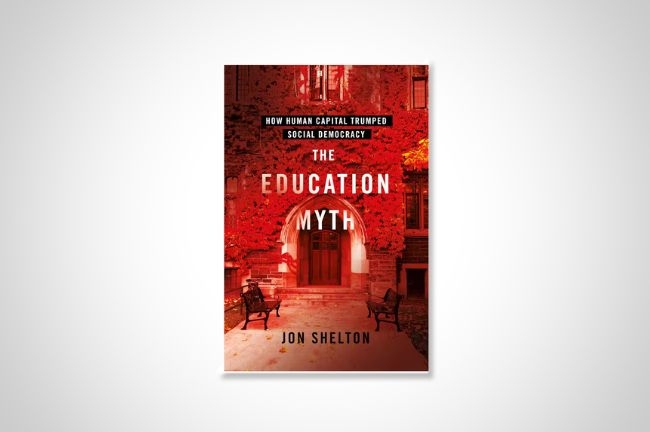You have /5 articles left.
Sign up for a free account or log in.

Cornell University Press
The Education Myth: How Human Capital Trumped Social Democracy by Jon Shelton
Published in March 2023
The books I want to read are the books that challenge my thinking. Teach me something new. Expose blind spots. Reveal and then question assumptions. Make me question my beliefs. Tell me where, when and how I’m wrong.
(These are the same qualities I seek in colleagues and friends).
Jon Shelton’s The Education Myth is testing my tolerance for doubt. Perhaps I only want to go so far in questioning my most deeply held convictions.
Ask me what is the key to a successful life and I will answer by saying, “Education.”
Query me on the optimal location of public investment and I will answer, “Education.”
Higher education, I believe, is the world’s most efficient engine of economic mobility.
Before reading The Education Myth, I never thought to question my faith in learning as the answer to almost every question.
As explained by Shelton (a professor at the University of Wisconsin at Green Bay), the education myth is that education (degrees, credentials, skills) is the only path for ensuring individual economic well-being. This myth holds that investments in education represent the best strategy for broadening access to secure middle-class jobs.
This philosophy can be summed up in the aphorism “You earn what you learn.” From the standpoint of reducing economic inequality and alleviating poverty, large-scale investments in educational access and quality will have the greatest returns.
But what if all this is wrong, or at least incomplete?
Shelton points out that the growth of a postwar middle-class society was not driven primarily by greater access to higher education, although the G.I. Bill certainly dramatically expanded the ranks of college graduates. Instead, advances in economic well-being followed the expansion of unions and the growth of secure manufacturing jobs. Growing inequality and stubbornly high poverty rates have not been alleviated by increases in the proportion of young adults attending college but abetted by the diminishing value of the minimum wage and the decline of union representation.
The Education Myth traces the intellectual and later policy pivots away from New Deal–era social democratic programs and toward a focus on the role of human capital. The book takes a deep dive into the policies of successive administrations, unpacking how both Democrats and Republicans embraced the education myth.
For Shelton, the roots of Trumpism are found in the decisions by mainstream politicians (in both parties) to double down on education as the cure for economic vulnerability. Vast numbers of working-class Americans came to believe that professionals looked down on them for failing to secure the education necessary for financial security. Not everyone has the means or desire to become a symbolic analyst, and assuming that coal miners will become coders is magical thinking.
Beliefs about the role of higher education changed from universities being institutions that developed citizens to places that created workers. We see this shift in the drop-off of students majoring in the humanities and the growth of business and other preprofessional majors.
The narrative that the purpose of a college education is to land graduates the best job and that the only path to a good job is a college education has given cover to states to disinvest from public institutions. If the benefits of higher education accrue to individuals, shouldn’t the costs for education be shouldered by its consumers?
(Note: Inside Higher Ed did a fantastic Q&A with Shelton about his book this past March.)
Are today’s university leaders out in front in the fights for a living wage, expanded union representation, affordable childcare and universal health care?
While academics may be viewed as liberals by the world outside academia, is it possible that our leftist credentials are not so strong?
The Education Myth has me wondering if, in buying into the education myth, I’m complicit in adding to the intellectual underpinnings of a structurally unequal economic system.
While I’ve consistently voted Democratic, I would never describe my political leanings as social democratic. As close as I’ve gotten to believing that the government guaranteeing a job is a good idea is to flirt with arguing for a universal basic income.
Shelton has not convinced me that my moderate, middle-of-road politics are misplaced. But his book has me wondering.
Are you as guilty as I am in promoting the education myth?
What are you reading?




